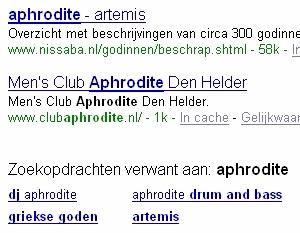Webdesign & SEO
SEO news blog archive.
News archive 2007 |
|||||
| Jan. | Feb. | Mar. | Apr. | Mai | Jun. |
| July | Aug. | Sep. | Oct. | Nov. | Dec. |
Revisions-inline and broad-revision - Related search results - Short search engine news (july 3. 2007)
Related search suggestions for a search query
One of the new features in Google's search results is, as you almost certainly came across, is the block with links for a 'related search'. Links to related search query's that Google calls revisions-inline and that are placed in a block called broad-revision.
Revisions-inline in the access_log
Those who check their access_log regularly must have noticed a few strange looking URl's comming from Google's search, that look similar to this one:
The URl, the trained eye almost immediately notices, has some extra parameters:
What do those parameters mean?
Lets have a close look at those parameters:
- The parameter revid=944852402
An identification number for the entire block of links - The parameter sa=X
For the moment unnokwn purpose. - The parameter oi=revisions_inline
The 'oi' could be as in OrIgin? in what part of the results page is the activated link standing. - The parameter resnum=0
For the moment unnokwn purpose. - The parameter ct=broad-revision
'ct' click through position...
in this case the section 'broad-revision' - The parameter cd=4
'cd' column display - in which column resided the activated link.
All those little pieces of information Google sends with the activated link attached to its URl with just one purpose, to gather as much data about the clicked link, the destination etc. to get more information about how efficient the links of certain parts on the results page are.
Example revisions-inline and broad-revision
Lets just see by an example search query what 'relevant searches' are shown. In this example we used the search phrase aphrodite. Below the 'natural' results the block with 'related' query's appears.

klick to enlarge
If we now hover over a link we will see the URl appear in the status bar:
The exact same URl will show up in the access_log. So no abacadabra, no manually corrections made by an Google employee and most certainly no automated correction.
If you have noticed these registrations, or will in the near future, you now know you don't have to be worried about your positions in Google's results, it is just another feature Google implemented to help us get better search results.

